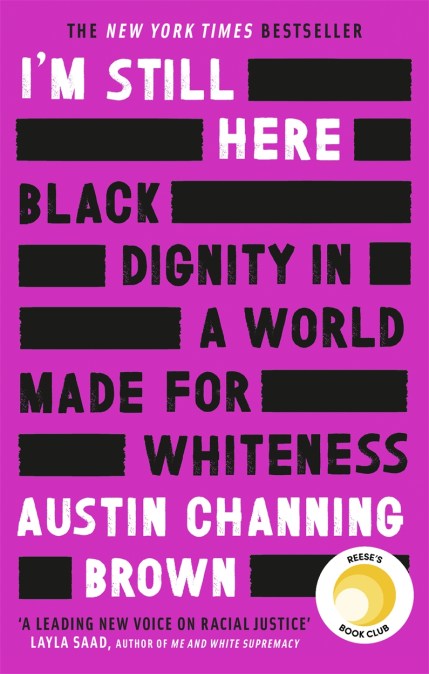A REESE’S BOOK CLUB PICK
A NEW YORK TIMES BESTSELLER
‘An example of how one woman can change the world by telling the truth about her life with unflinching, relentless courage’ GLENNON DOYLE
Austin Channing Brown’s first encounter with racism in America came at age seven, when she discovered her parents named her Austin to deceive future employers into thinking she was a white man. Growing up in majority-white schools and neighbourhoods, Austin ‘had to learn what it means to love Blackness,’ a journey that led to her becoming a writer, speaker and expert helping organisations practice genuine inclusion. In this bestselling memoir, she writes beautifully and powerfully about her journey to self-worth and how we can all contribute to racial justice.
‘A leading new voice on racial justice’ LAYLA F SAAD, author of ME AND WHITE SUPREMACY
‘Most people say, “that books has legs”; I measure the impact of a book by how often I throw it across the room. [Austin’s book] has serious wings. It broke me open’ BRENE BROWN
‘A deeply personal celebration of blackness that simultaneously sheds new light on racial injustice and inequality while offering hope for a better future’ SHONDALAND
A NEW YORK TIMES BESTSELLER
‘An example of how one woman can change the world by telling the truth about her life with unflinching, relentless courage’ GLENNON DOYLE
Austin Channing Brown’s first encounter with racism in America came at age seven, when she discovered her parents named her Austin to deceive future employers into thinking she was a white man. Growing up in majority-white schools and neighbourhoods, Austin ‘had to learn what it means to love Blackness,’ a journey that led to her becoming a writer, speaker and expert helping organisations practice genuine inclusion. In this bestselling memoir, she writes beautifully and powerfully about her journey to self-worth and how we can all contribute to racial justice.
‘A leading new voice on racial justice’ LAYLA F SAAD, author of ME AND WHITE SUPREMACY
‘Most people say, “that books has legs”; I measure the impact of a book by how often I throw it across the room. [Austin’s book] has serious wings. It broke me open’ BRENE BROWN
‘A deeply personal celebration of blackness that simultaneously sheds new light on racial injustice and inequality while offering hope for a better future’ SHONDALAND
Newsletter Signup
By clicking ‘Sign Up,’ I acknowledge that I have read and agree to Hachette Book Group’s Privacy Policy and Terms of Use
Reviews
I have laughed, I have held back tears, I have reflected with joy, hope and hurt while reading. Austin captures perfectly the sentiment of many black people in America. She's not only telling her story, she's telling our story. Austin is a gift to the body and the culture
Powerful . . . Brown calls on readers to live their professed ideals rather than simply state them
Austin Channing Brown introduces herself as a master memoirist. This book will break open hearts and minds
Most people say, 'that books has legs;' I measure the impact of a book by how often I throw it across the room. [Austin's book] has serious wings. It broke me open
A deeply personal celebration of blackness that simultaneously sheds new light on racial injustice and inequality while offering hope for a better future
Brown passionately rejects facile reliance on 'hope,' stating that 'in order for me to stay in this work, hope must die' and 'the death of hope gives way to a sadness that heals, to anger that inspires, to a wisdom that empowers me.' An eloquent argument for meaningful reconciliation focused on racial injustice rather than white feeling
Takes readers on a journey through the racial divide in a way we've truly never seen before. Powerful, haunting, and absolutely impossible to put down, [Brown's] account of what it's like to grow up black, middle-class, and female in modern America is not to be missed
Austin Channing Brown is a leading new voice on racial justice and she is the author of one of my favourite books of 2018, which is called I'm Still Here: Black Dignity in a World Made for Whiteness. Austin is committed to exploring the intersections of racial justice, faith, and Black womanhood
The movement toward diversity and forgiveness, [Brown] points out, too often involves white people seeking credit for recognizing the crimes of the past even as they do nothing to fix things today, and black people being required to provide endless absolution and information while calmly enduring dignity-eroding and rage-inducing injustices

